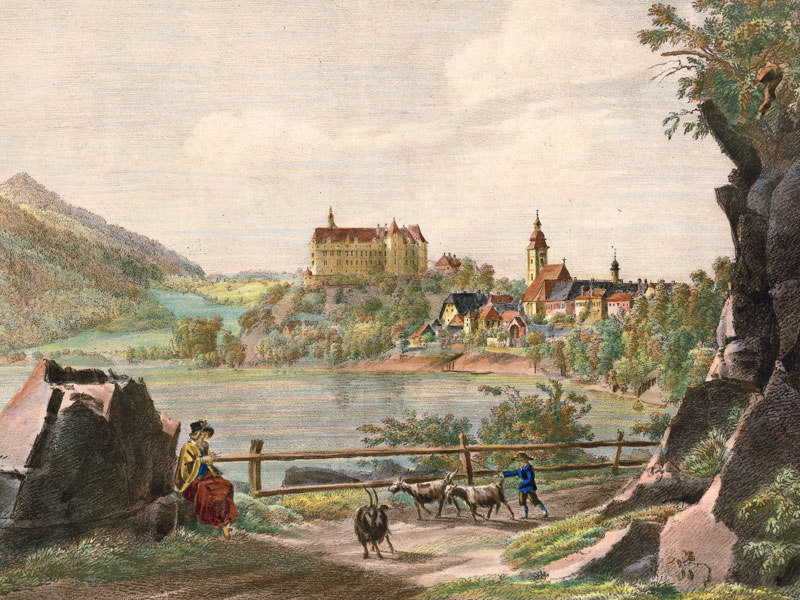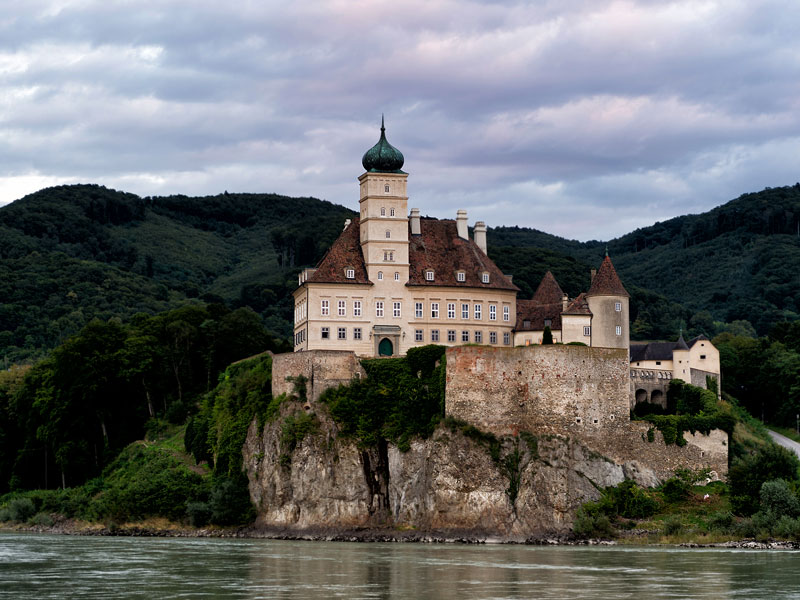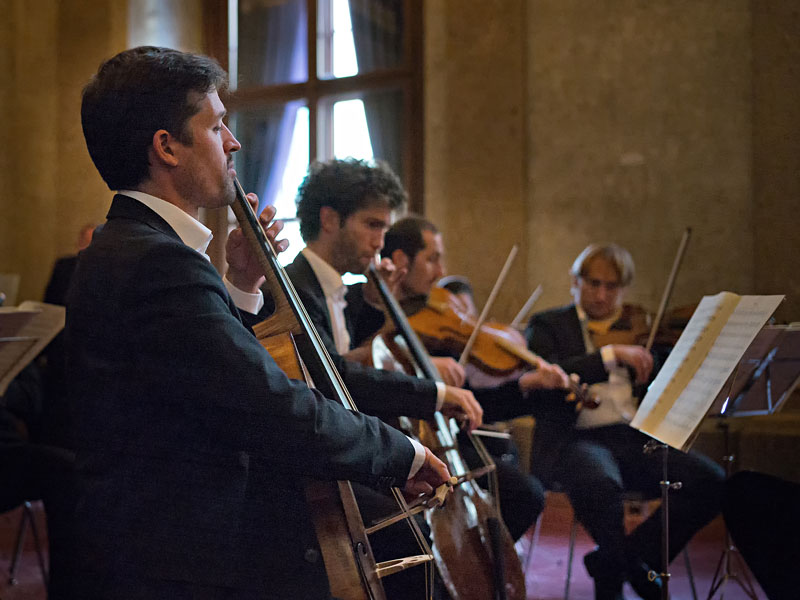Overview
Eight private concerts in appropriate historic buildings, world-class artists, illuminating talks, a daily diet of beautiful landscape and picturesque streets, the comfort and convenience of a first-class river cruiser: this iteration of Music Along the Danube follows the winning formula that we first launched in 1994 – with, for the first time, a programme which is mainly Mozart.
Music and place
The key feature is the combination of music and place. Concerts take place in buildings that are among the most beautiful in the Danube valley – palaces, monasteries, country houses and a historic theatre – and all date to the 18th century. Mozart would have known many of them and probably performed in some.
Exclusive concerts
The performances are private, being exclusive to the participants who take the festival package (see details opposite). The small size of the audience and venues leads to an intimacy that engenders a rare intensity of musical communication. Musicians love playing for this festival. Not only are the venues an inspiring change from conventional concert halls, but the audiences are attentive and appreciative.
Travelling in comfort
Chartered exclusively for the festival audience (122 maximum), the MS Riva was launched in 2023. Acting as both hotel and principal means of transport, it enables passengers to attend all the concerts and see some of the finest sights in the region without having to change hotel or drive long distances. In many ways, however, your experience will be far removed from the usual cruising routine. There is little regimentation, no obligatory seating plan, no on-board entertainment, no intrusive announcements – and absolutely no piped music.
The spoken word
Daily talks by music historians enlighten, stimulate, and inform. On board the ship the speaker is Nicholas Kenyon and Richard Wigmore accompanies the walking party – see opposite for their biographies.
For your eyes
The itinerary takes you through some of the most enchanting riverine landscape in Europe. This stretch of the Danube is largely flanked by rumpled hills, clad in woodland and pasture and striated by viticulture. We visit deliciously picturesque towns and villages and spend time in the incomparable city of Vienna, magnificent relic of a great empire. Art and architecture of the 18th century are major ingredients of the festival.
The River Danube
The stretch of river between Passau and Bratislava is one of the loveliest lengths of riparian scenery anywhere in the world.
To write about the Danube is to embark on the life story of a large part of Europe. Unlike every other long river between the Urals and the Bay of Biscay, this majestic stream has never been the possession of any single state or even of any single empire – whether Frank or Slav, Magyar, Teuton or Turk. Through all geo-political obsessions, the Danube has moved with serene impartiality.
This is simply the biggest river of Europe. From its origins in south-western Germany, the Danube flows to the Black Sea over a course of about 1,750 miles, gathering force from waters which drain 300,000 square miles and passing through ten countries. More than 300 often furious tributaries pour their national waters into the Danube, but the river placidly swallows them all.
To travel with the Danube is a European experience. There may be no better way of growing into the knowledge of why Europe, even this middle Europe of so many conflicts in the past, has been more than the sum of its parts; and of why these parts, however little they may have seemed to belong to each other (much less love each other), have remained members of one body and segments of
one civilisation.
A wonderful diversity of scene complements the ethnic, linguistic and national variety. The stretch between Passau and Bratislava is one of the loveliest lengths of riparian scenery anywhere in the world. Its monuments are many and remarkable. And nowhere on Earth can match the Danube region for its contribution to the canon of classical music over the course of several hundred years.
Meet the musicians
Akademie für Alte Musik Berlin (Akamus)
The Akademie für Alte Musik Berlin (Akamus) celebrated its 40th anniversary in 2022. Founded in Berlin in 1982, the ensemble is now one of the world’s leading chamber orchestras playing historically informed music. For four decades, the orchestra has demonstrated its versatility with exciting concert projects and musical voyages of discovery, for example making a significant contribution to the rediscovery of the music of C.P.E. Bach and Telemann.
Duo Pleyel
Duo Pleyel takes its name from Alexandra Nepomnyashchaya and Richard Egarr’s pet piano – a beautiful instrument made in 1848 by Chopin’s preferred maker, Pleyel. The Duo has been working for the past five years to bring the rich and exciting repertoire for piano ‘for four hands’ to a wider public.
Michael Collins
Michael Collins is one of the most distinguished musicians of his generation. With a continuing, distinguished career as a soloist, he has in recent years also become highly regarded as a conductor.
Minetti Quartet
Based in Vienna since it was founded in 2003, when the quartet met at the Vienna University of Music. The name ‘Minetti’ refers to a play by the writer Thomas Bernhard, who lived in the Salzkammergut where two of the quartet grew up. Since being nominated as ‘Rising Stars’ by the European Concert Hall Organisation in 2008/09, the Minetti Quartet has performed repeatedly in the most renowned concert halls in Europe. It has enjoyed an international reputation, with tours in Europe, Asia, North and South America. The quartet has had its own concert cycle in the MuTh, Vienna’s newest concert hall, since 2017/18.
The Mozartists
Under the direction of conductor Ian Page, The Mozartists (formerly Classical Opera) have established themselves among the most exciting period-instrument ensembles in Europe, attracting recognition for their fresh, dramatic and stylish performances, their imaginative and innovative programming, and their ability to discover and nurture outstanding young artists.
Ian Page
Ian Page is the founder, conductor and artistic director of The Mozartists, and has established an outstanding reputation as one of the world’s leading interpreters of the music of Mozart and his contemporaries.
Peter Donohoe
Peter Donohoe was born in Manchester in 1953. He studied at Chetham’s, Leeds University, the Royal Northern College of Music and then in Paris with Olivier Messiaen. He is acclaimed for his musicianship, stylistic versatility and commanding technique, as one of the foremost pianists of our time.
Quatour van Kuijk
‘Style, energy and a sense of risk. These four young Frenchman made the music smile.’ The Guardian
The Van Kuijk Quartet has won numerous accolades, including First, Best Beethoven, and Best Haydn Prizes at the 2015 Wigmore Hall International String Quartet competition. They were BBC New Generation Artists from 2015–17, and ECHO Rising Stars (2017/18).
Vienna Chamber Orchestra (Wiener Kammerorchester)
Founded in 1946, the Vienna Chamber Orchestra is one of the world’s leading large chamber ensembles.
Wolfgang Redik
Born in Graz, the violinist Wolfgang Redik studied in his home town and later completed his studies at the Vienna Music Academy. Redik has devoted much of the past 25 years to chamber music (string quartets 1987–1992, founding member of the Vienna Piano Trio 1988–2012), but these days he spends more and more of his time as a leader, soloist and conductor, frequently leading the Camerata Salzburg, the Vienna Chamber Orchestra and the Vienna Symphony, among others. Kent Nagano personally invited him to lead and conduct the Montreal Symphony Orchestra on a regular basis.
Vienna Chamber Choir (Wiener Kammerchoir)
Since its founding in 1947, the Vienna Chamber Choir (Wiener Kammerchor) has developed into a trend-setting international ensemble for the modern interpretation of choral music. It occupies a place on the Austrian cultural scene and at a range of important European festivals that would otherwise be difficult to fill.
Michael Grohotolsky
Born in Vienna, Michael Grohotolsky began his musical career as an alto soloist with the Vienna Boys’ Choir. Since 2006, he has been a lecturer in conducting and the direction of vocal and instrumental ensembles at the University for Music and the Performing Arts in Vienna.
Day 1
Sunday 28 July
Passau
Fly from London Heathrow or Manchester or make your way to Passau independently.
The ship is ready for boarding from 4.00pm. Afternoon tea is available upon arrival.
Piled up on promontories at the confluence of three rivers, the Bavarian city of Passau is crammed with historic buildings, dominated by the great Baroque cathedral. It was one of the most important episcopal seats in Central Europe and served as a refuge for the Habsburg court in times of danger.
The ship sails at 6.30pm. A reception is followed by dinner.
Day 2
Monday 29 July
Grein, Melk
Moor at Grein, a charming little town squeezed between the Danube and the hills with a 16th-century Schloss rising to one side. The series of daily lectures begins.
It is a short walk from the ship to the main square where the tiny theatre lies hidden within the town hall. Constructed in 1791, it is the oldest working theatre in Austria.
Concert, 10.45am
Grein, Stadttheater
Michael Collins clarinet
Minetti Quartet
Clarinet Quintets
Inspired by his friend Anton Stadler, Mozart was the first composer to exploit the full potential of the clarinet, that beautiful latecomer to the woodwind family. His ever-popular quintet, rich in alluring melody and capped by a Papagenoish finale, is complemented by the entertainingly theatrical quintet by Carl Maria von Weber, whose Fantasia slow movement gives a distant pre-echo of Gershwin’s Rhapsody in Blue.
Return to the ship for lunch and sail downstream through the Wachau, one of the most beautiful stretches of the Danube.
In the early afternoon, the domed abbey of Melk appears ahead on an outcrop beside the river. Its formidable bulk presents to the world an image of awesome power, and there is no diminution of this impression inside. Stone, stucco, paint, gold and all the media at the disposal of craftsmen and artists in the 18th century combine to create some of the giddiest heights ever attained in Baroque art.
A tour of the abbey passes through a sequence of ceremonial courtyards, guest apartments, hall and library, culminating in a church of unsurpassed decorative richness.
The concert takes place in the Kolomanisaal, the summer refectory of the abbey. Walls and vault are covered in frescoes by Gaetano Fanti and Paul Troger, the leading fresco specialists of their time in the Austrian empire.
Concert, 4.45pm
Melk Abbey, Kolomanisaal
Vienna Chamber Orchestra
Wolfgang Redik violin, concertmaster
Mozart Symphonies
While it is a romanticising fallacy to view No.s 39, 40 and 41 as Mozart’s symphonic testament, he does seem to have designed the trilogy as a showcase for the fullest range of his art. No. 40 in G minor veers between lyrical pathos and a violence unmatched in eighteenth-century symphonies, while the ‘Jupiter’, No. 41, with its stupendous contrapuntal finale, crowns a long Austrian tradition of ceremonial symphonies in C major. In more relaxed mode are the delightful violin Rondo and Adagio, composed for the Salzburg concertmaster Brunetti.
Return to the ship for dinner and sail overnight to Vienna.
Day 3
Tuesday 30 July
Vienna, Klosterneuburg
Wake up at a mooring 20 minutes from the centre of Vienna.
Principal seat of the Habsburgs for over 600 years, Vienna became capital of a vast agglomeration of territories that encompassed much of central and eastern Europe. The fabric of the city is a glorious mix of the magnificent and the charming, the imperious and the unpretentious. It remains one of the world’s greatest centres for the arts, and has no rivals for its dominant place in the history of music.
The morning is free to explore the city and visit a museum or two. The Kunsthistorisches Museum should not be missed, the Belvedere Palace has paintings by Klimt, the Beethoven apartment is fascinating, MAK an exciting museum of decorative arts. We will give guidance.
In the early afternoon there is a short coach journey to Klosterneuburg Abbey, where guided tours precede the late-afternoon concert.
Founded in 1114, Klosterneuburg Abbey is best known as the ‘Austrian Escorial’, a Baroque monastery-palace begun by Emperor Charles V in 1730 but left incomplete 100 years later. From the Middle Ages there remain a beautiful cloister and some astonishing artworks. The concert takes place in the Augustinus Hall, a charming Rococo room off a quiet courtyard.
Concert, 4.00pm
Klosterneuburg Abbey, Augustinus Hall
Duo Pleyel (piano ‘for four hands’)
Mozart’s Real Father
Mozart was rarely one to go overboard about fellow composers. But he retained a special affection for J.S. Bach’s youngest son, Johann Christian, who had befriended the boy Mozart in London. As the solo and duo sonatas here reveal, Christian was a master of euphonious galanterie, and perhaps the crucial influence on Mozart. In this beguiling programme of solo and duo sonatas you might even be forgiven for mistaking one composer for the other!
Return to the ship by coach. Dinner on board while sailing downstream.
Day 4
Wednesday 31 July
Schloss Hof, Bratislava
The ship moors in the early hours in the little Austrian town of Hainburg (Haydn went to school here) before participants transfer by coach to Schloss Hof.
Schloss Hof was enlarged by Lukas von Hildebrandt, the great architect of the early 18th century, as a grand hunting lodge for Prince Eugene of Savoy, the most distinguished soldier ever to have served the Habsburgs. It was later occupied by members of the imperial family. A major programme of restoration in the last 20 years has rescued the house and gardens from near dereliction.
Concert, 11.15am
Schloss Hof, Festsaal
Quatuor Van Kuijk
String Quartets: Lodi, Dissonance, Rider
As an aperitif to two contrasting Classical masterpieces the Van Kuijk Quartet offer the teenaged Mozart’s very first quartet, a sparkling, serenade-like work composed in the Italian town of Lodi. Fifteen years later the tortuous, dissonant slow introduction of Mozart’s otherwise sunny C major Quartet became something of a cause célèbre. Written for London, Haydn’s so-called ‘Rider’ Quartet contains a beautiful hymnlike Largo in a remote key and a coursing finale that gives the work
its nickname.
Sail downstream to Bratislava.
Now capital of Slovakia, Bratislava was for 70 years the second city of Czechoslovakia and for 300 years before that the capital (as Pressburg) of the Habsburg rump of Hungary while Ottoman Turks occupied most of the country. Its compact historic centre is a dense mesh of unspoilt streets, squares and restored façades. There is a choice of museums and historic buildings to visit before an early-evening concert.
Of the many mansions in Bratislava, the grandest is the Primatial Palace, formerly the seat of the Archbishop of Hungary and now the Town Hall. It was completed in 1781 to designs by Melchior Hefele. The concert takes place in the Mirror Hall, the main reception room.
Recital, 5.15pm
Bratislava, Primatial Palace
Peter Donohoe
Mozart Piano Sonatas
The 19-year-old Mozart composed these, his earliest surviving keyboard sonatas, both for his own performance and for publication – though in the event only the last and most brilliant of the set, the D major, K284, was published. After playing all six sonatas on a new fortepiano in Augsburg he wrote euphorically to his father that ‘the last one, in D, sounds absolutely marvellous on Stein’s fortepiano’. Peter Donohoe caps this Mozart programme with Liszt’s fiendishly challenging Fantasy on themes from Don Giovanni. Far from being a mere potpourri, the Fantasy is a powerfully concentrated work that illuminates Mozart’s drama in ingenious new ways.
Return to the ship for dinner and sail upstream overnight to Vienna.
Day 5
Thursday 1 August
Vienna
Moor again at Nussdorf in Vienna. Most of the day is free to continue to explore the wealth of museums and galleries.
The winter palace of the Habsburg emperors, the Hofburg is a vast agglomeration of buildings which grew during the course of six centuries of building and refurbishment. Our concert takes place in the Rittersaal, a mid-eighteenth-century hall with white and gold Rococo stucco and woodwork and red silk wall hangings.
Concert, 4.30pm
Hofburg, Rittersaal
The Mozartists (five solo voices)
Ian Page piano
The A–Z of Mozart Opera
Mozart was a born theatre animal, never happier than with the whiff of greasepaint in his nostrils. In their operatic A-Z The Mozartists present an ingenious chronological journey that travels from A (the Latin drama Apollo et Hyacinthus, composed when he was eleven) to Z (Die Zauberflöte, from his hectic final year, 1791). En route they take in solos and ensembles from rarities such as the sparkling Italian comedy La finta semplice and the unfinished harem opera Zaide.
Dinner on board, though lingering in Vienna is an option. Sail upstream in the early morning.
Day 6
Friday 2 August
Maria Taferl
A day of sailing through the beautiful Wachau Valley takes us from Vienna to the church of Maria Taferl. With its towers, gilded interior and hilltop site, Maria Taferl is one of Austria’s finest sights as well as one of the most important pilgrimage churches in the Alpine region. Construction took from 1660 to 1720, Carlo Lugaro and Jakob Prandtauer being the principal architects. Fitting out and decoration continued into the later
18th century.
Concert, 6.00pm
Pilgrimage Church of Maria Taferl
Vienna Chamber Choir
Sacred Mozart
The headline work in this programme is Mozart’s popular Solemn Vespers setting, K339, with its limpid ‘Laudate Dominum’ for soprano – a Mozartian desert island choice for many. Sacred and secular often blur here and in the lesser known works (‘Te Deum’ K141, ‘Venite populi’ K260, Church Sonata No.6, K212) likewise written for Salzburg Cathedral.
All three are full of that worldly exuberance characteristic of Mozart’s sacred music, while the offertory ‘Venite populi’ deploys a double choir in thrilling displays of counterpoint.
Sail overnight to Linz.
Day 7
Saturday 3 August
Linz
Arrive in Linz in the early morning. The historic capital of Upper Austria, Linz is a picturesque maze of streets, alleys and historic buildings grouped around a huge market square, only yards from the mooring. There is time for some independent exploration before coaches depart for the early-afternoon concert.
Founded in the eighth century, the Monastery of St Florian became one of the richest in the Austrian Empire. Wholesale rebuilding took place between 1686 and 1751, Austria’s great period of political and military confidence and architectural ambition. The concert takes place in the Sala Terrena (Garden Hall), a room used for music making.
Concert, 2.30pm
St Florian Monastery, Garden Hall
Akademie der Alte Musik Berlin
Finale: Serenades
Either side of a charming wind nocturne by the unfairly maligned Antonio Salieri are two Mozart serenades that raised the art of wind-band music (Harmonie) to new heights. Both the E flat Serenade and the so-called Gran Partita for twelve wind instruments and double bass delight and astonish with their melodic allure and kaleidoscopically varied colours. In the play and film Amadeus it was the celestial Adagio of the Gran Partita that first convinced Salieri of Mozart’s divinely inspired genius.
Sail upstream overnight from Linz to Passau, with a reception and dinner against a backdrop of river and wooded hills receding into the dusk.
Day 8
Sunday 4 August
Passau, Munich
The ship moors at Passau and coaches leave for Munich city centre and the airport between 8.30 and 9.30am. See the practicalities tab for the options available for return travel to London.
Selecting Option 2 allows for an afternoon of independent sightseeing in Munich.
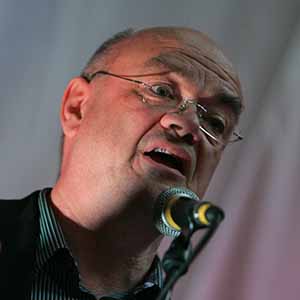
Sir Nicholas Kenyon
Managing Director of the Barbican Centre since 2007; former Controller of BBC Radio 3 and Director of the BBC Proms. He has been music critic for The New Yorker and The Observer, music editor of The Listener and editor of Early Music. He is author of the Faber Pocket Guides to Bach and Mozart, and edited Authenticity & Early Music and The City of London: a companion guide. Twitter: @NickRKenyon
The festival package
Access to the concerts is exclusive to those who take the festival package, the price for which includes:
— Eight private concerts.
— Daily talks on the music.
— Accommodation on a first-class river cruiser for seven nights (or in hotels for the walking party).
— Return flights between the UK and Munich – reduced price if you choose to opt out of these.
— All meals, with wine and other drinks, interval drinks.
— Coach travel for airport transfers and to the concert venues when not within walking distance of the mooring.
— Tips, taxes and admission charges.
— Programme booklet with full details of the event.
— Assistance of an experienced team of German-speaking festival staff.
— Optional post-festival tour: King Ludwig II, 4–9 August 2024.
Festival flight options
Actual flight schedules for July/August 2024 are not yet available. These are the most likely times (they rarely change) but they will be updated as soon as the times for next summer are released.
Option 1
Heathrow, lunch at Landshut
Sunday 28 July: Heathrow to Munich (LH 2471) departing at 09.00 and arriving at 11.50. Break the drive to Passau with lunch at Landshut, a former capital of Bavaria. There are two hours here; it should be possible to see the main street with its Renaissance and Baroque house fronts, the great Gothic church of St Martin or the precociously Italianate Renaissance ducal palace.
Sunday 4 August: Munich to London Heathrow (LH 2476) departing at 14.45 and arriving at 15.45.
Option 2
Heathrow, free time in Munich
Sunday 28 July: London Heathrow to Munich (LH 2473) departing at 10.50 and arriving at 13.40. Drive directly from the airport to the ship at Passau, a journey of under two hours.
Sunday 4 August: Munich to London Heathrow (LH 2480) departing at 18.40 and arriving at 19.40. Coaches take you first to the centre of Munich, where you have about four hours of free time.
Option 3
Manchester
Sunday 28 July: Manchester to Munich (LH 2501) departing at 10.45 and arriving at 13.40. Drive directly from the airport to the ship at Passau, a journey of under two hours.
Sunday 4 August: Munich to Manchester (LH 2502) departing at 15.55 and arriving at 17.00. Coaches take you first to the centre of Munich, where you have about two hours of free time.
Rail
It is possible to travel by train from London to Passau, c. 18 hours (with an overnight in Brussels), departing Saturday evening (27th July) and arriving Sunday afternoon (28th July). The return journey takes c. 11 hours via Cologne and Brussels. We are able to advise on but not book individual train tickets. Contact us for more information and recommendations for booking agents.
The ‘no group travel’ option
You can choose not to take any of our flight options and to make your own arrangements for joining and leaving the ship. You are welcome to join our airport coach transfers if your flights or trains coincide with any of the options above.
Price reduction for ‘no flights’: £220.
Post-festival tour
The price for post-festival tour King Ludwig II includes the option of a return flight – out at the start of the festival, and back at the end of the tour.
All post-festival tour participants depart from the UK on festival flight option 2.
We charge for flights, if you are taking them, as part of your post-festival tour booking. You therefore pay the ‘no flights’ price for the festival.
Details of the post-festival tour to be announced shortly – please contact us to register your interest.
Accommodation & prices
The ship
Launched in 2023, the Amadeus Riva is one of the newest and most comfortable cruisers on the waterways of Europe. The multinational crew is dedicated to the highest standards of service.
With a floor area of 16m2 (Haydn deck) or 17.5m2 (Strauss and Mozart decks) the cabins are reasonably spacious by the standards of river cruisers. All have windows to the outside and are equipped with the facilities one would expect of a first-class hotel such as adjustable air-conditioning, telephone, TV and safe.
Bathrooms have showers only. Special attention has been paid to noise insulation.
In layout and furnishings the cabins are identical, the significant differences being the size of windows and height above water level (higher cabins enjoy better views and fewer stairs).
Cabins on the top decks (Mozart and Strauss) are the most desirable, with floor-to-ceiling windows which slide open and minibars. There are twelve suites (Mozart) measuring 26.4m2 with a corner sofa area and small balcony. Cabins on the lowest (Haydn) deck have smaller windows which don’t open. There are no single cabins as such but we are allocating some twin-bed cabins for single occupancy.
The public areas include the lounge and bar, a library area and a restaurant that can seat everyone at a single sitting. The sun deck has a tented area for shade.
Haydn deck – lowest
Two sharing: £3,670 per person
Single occupancy: £4,320
Strauss deck – middle
Two sharing: £4,390 per person
Single occupancy: £5,240
Mozart deck – top
Two sharing: £4,910 per person
Single occupancy: £5,810
Suites – Mozart deck
Two sharing: £5,780 per person
Not available for single occupancy
More about the concerts
Private. All the performances are planned and administered by us, and the audience consists exclusively of those who have taken the festival package.
Seating. Specific seats are not reserved. You sit where you want.
Acoustics. This festival is more concerned with locale and authenticity than with acoustic perfection. The venues may have idiosyncrasies or reverberations of the sort not found in modern concert halls.
Changes. Musicians fall ill, venues may close for repairs, airlines alter schedules: there are many circumstances which could necessitate changes to the programme. We ask you to be understanding should they occur.
Floods and droughts. We cannot rule out changes to the programme arising from exceptionally high or low water levels on the Danube, either of which may bring river traffic to a halt. These might necessitate more travel by coach or the loss of a concert, though we would always try to minimise the impact on the itinerary.
Fitness for the festival
Quite a lot of walking is necessary to reach the concert venues and to get around the towns visited. The ship has a lift, but some of the venues do not. Participants need to be averagely fit, sure-footed and able to manage everyday walking and stairclimbing without difficulty.
We ask that you take the simple fitness test linked below before booking.
If you have a medical condition or a disability which may affect your holiday or necessitate special arrangements being made for you, please discuss these with us before booking – or, if the condition develops or changes subsequently, as soon as possible before departure.
Are you fit enough to join the tour?
Combine with
Danish Art & Design, 13–21 July 2024
Franconia, 19–26 July 2024
Opera in Munich & Bregenz, 21–27 July
King Ludwig II, 4–9 August (post-festival tour – a transfer from the festival is provided)
Travel advice
Before booking, please refer to the FCDO website to ensure you are happy with the travel advice for the destination(s) you are visiting.
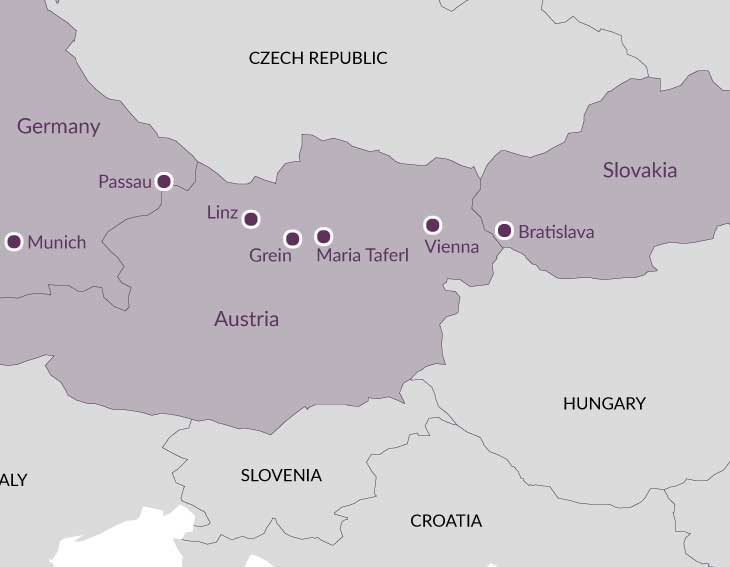
'The opportunity to hear top class artists in attractive surroundings without the hassle of booking, travel and planning is worth a lot.'
'Outstanding. It would be hard to think of where else one might attend such a series of concerts of such a high standard in so short a period of time. It was a quality tour, in a beautiful part of the world, with world class concerts supported by good food and wine.'
'This was my first experience of cruising but I hope not my last. The ship was comfortable and the crew provided good service. The food was excellent.'
'One of the best organised holidays in my experience; superb attention to detail, very good lecturers, excellent musicians. A world class experience.'
'The music was very high quality with the enjoyments of listening to it heightened by the settings in which it was performed. Overall I thought the programme was most thoughtfully put together to give a balanced and memorable musical experience.'
'Meals served by a genial crew to just over 100 people all at the same time are impressive, a triumph of imagination and organisation.'
